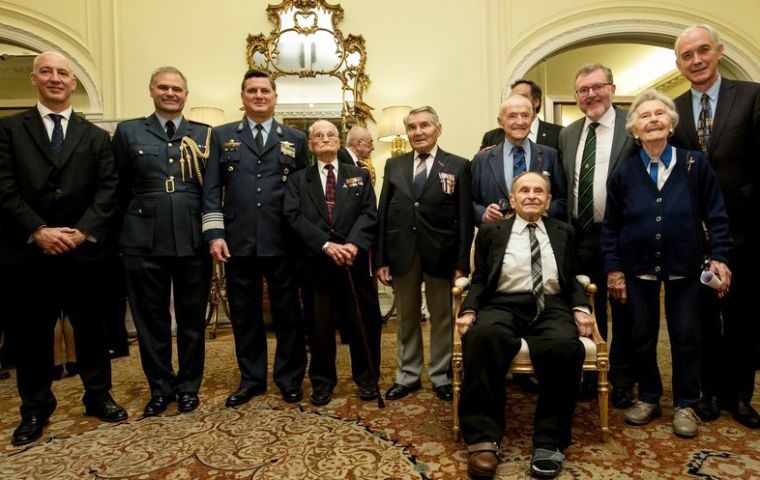MercoPress. South Atlantic News Agency
British Embassy Buenos Aires holds reception to honor five World War II veterans.
 Amb. Mark Kent, Gp. Capt. RobSmith, Defence Attache; Greater Brigadier F. Nieto, Deputy Chief Argentine Air Force and D. Mundell, Secretary of State for Scotland with with argentine-polish veterans
Amb. Mark Kent, Gp. Capt. RobSmith, Defence Attache; Greater Brigadier F. Nieto, Deputy Chief Argentine Air Force and D. Mundell, Secretary of State for Scotland with with argentine-polish veterans Battle of Britain Sunday commemorates the great victory won by the Royal Air Force (RAF), which saved Britain from invasion in 1940. On Sunday 15 September came what Sir Winston Churchill called “one of the decisive battles of the war” and with it, the Luftwaffe’s greatest defeat.
Many Argentines, descendants from British families living in Argentina, listed themselves as volunteers to serve and join the British forces in World War II. Many of them were assigned to the RAF and were part of the legendary No. 164 “Argentine-British” Squadron which was composed of Argentine and Polish volunteers.
The No. 164 Squadron’s coat of arms finds its origins in 1918 although, by that time, it didn’t have a motto. Mr Miguel Angel Carcano, who was the Argentine Ambassador in London, suggested that it should be “Firmes volamos” (Firmly we fly). The idea for the insignia of the British lion in front of a rising sun representing Argentina was also Carcano’s. The coat of arms wasn’t recognized until 1943 when the Duke of Gloucester presented the Squadron officially at a ceremony in front of Air Marshalls Sir Hugh Sanders, Roderick Hill, and members of the British community in Argentina. It was the only squadron whose name was inscribed in Spanish.
Argentine men from British families were not the only ones who volunteered, there were many women who also had a prominent participation during World War II. Maureen Dunlop, an Argentine volunteer, became an Air Transport Auxiliary (ATA) pilot in the RAF during the Second World War, and Rosemary Simpson another Argentine volunteer who participated in the Royal Army Ordinance Corps (RAOC), part of the British Army.
In a reception at the HM Ambassador’s residence, we honored Ronnie Scott, the son of a Scottish immigrant, who in 1943 enlisted as a pilot in the British military; Stanley Coggan, a veteran of the Second World War who was a Flying Officer; Mary Chapman, also Scottish, who has been living in Argentina for 70 years, but before that a cryptographer in British military defense during World War II: Antoni Żebrowski, who was born in Poland and was trained as a combat pilot by the RAF, and then fought between 1943 and 1944 and Dennis Crisp.
One of Sir Winston Churchill’s most famous quotes was delivered in the midst of the Battle of Britain:
“The gratitude of every home in our Island, in our Empire, and indeed throughout the world, except in the abodes of the guilty, goes out to the British airmen who, undaunted by odds, unwearied in their constant challenge and mortal danger, are turning the tide of the World War by their prowess and by their devotion. Never in the field of human conflict was so much owed by so many to so few”.




Top Comments
Disclaimer & comment rules-

-

-

Read all comments@TH Are you objecting to the first comment? Did you understand the substance of the first comment? Do you understand the difference between your ordinance and your ordnance?
Oct 09th, 2017 - 06:03 am +2@TH Do you understand what is wrong with this phrase from the original text ?
Oct 09th, 2017 - 01:13 pm +2“ ....who participated in the Royal Army Ordinance Corps ....”
The only thing wrong is your misunderstanding the original identification of the problem.
Oct 09th, 2017 - 03:07 pm +2Commenting for this story is now closed.
If you have a Facebook account, become a fan and comment on our Facebook Page!